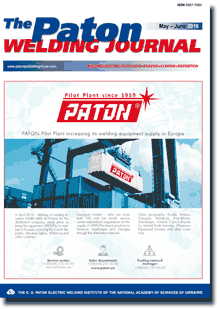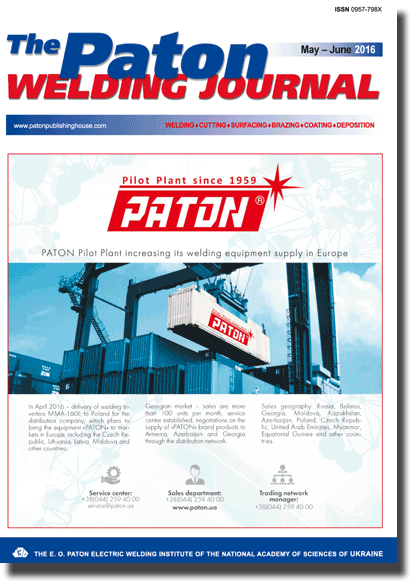| 2016 №06 (03) |
DOI of Article 10.15407/tpwj2016.06.04 |
2016 №06 (05) |

The Paton Welding Journal, 2016, #5-6, 24-28 pages
Effect of non-metallic inclusions of rail steel on welded joint formation
S.I. Kuchuk-Yatsenko, V.I. Shvets, A.V. Didkovsky and E.V. Antipin
E.O. Paton Electric Welding Institute, NASU 11 Kazimir Malevich Str., 03680, Kiev, Ukraine. E-mail: office@paton.kiev.ua
Abstract
On the railways of Ukraine since 2012 the laying of high-strength rails of steel grade K76F of Company «MK Azovstal» production, as well as rails produced in Russia, in tracks began. For this purpose at PWI the technology for flash-butt welding of high-strength rails of different production was developed, providing the values of strength and ductility of welded joints required according to the Technical Specifications. In the process of industrial implementation of technology for welding the high-strength rails by the rail welding enterprises of Ukraine a large amount of information was gained on the results of complex application of in-process control with non-destructive and destructive testing methods. It was established that the formation of metal structure in the joint zone alongside with energy input has a significant influence on the composition and distribution of non-metallic inclusions in the base metal of welded rails. The type and the structure of defects are largely determined by the composition of non-metallic inclusions. This effect is manifested in different degrees during changes in energy input in the process of welding. 5 Ref., 3 Tables, 8 Figures.
Keywords: flash-butt welding, flashing, rails, high-strength rails, pulsed flashing, defects in rails, non-metallic inclusions, dull spots, quality control, continuous track
Received: 16.05.16
Published: 19.07.16
References
- Kuchuk-Yatsenko, S.I., Lebedev, V.Kh. (1976) Continuous flash-butt welding. Kiev: Naukova Dumka.
- Kuchuk-Yatsenko, S.I., Krivenko, V.G., Didkovsky, A.V. et al. (2012) Technology and new generation of equipment for flash butt welding of advanced high-strength rails for construction and reconstruction of high-speed railway lines. The Paton Welding J., 6, 22–26.
- TU U 27.1-40081293-002:2016: New welded rails for railroads. Dnipropetrovsk: Ukrzaliznytsya.
- Dementiev, V.P. (2002) Liquation in R65 profile of rail steel. Izvestiya Vuzov. Chyorn. Metallurgiya, 10, 1–9.
- Zabilsky, V.V., Nikonova, R.M. (2005) Tought-brittle transition in steels at near-solidus temperatures. Mechanism of grain boundary embrittlement. FMM, Vol. 99, Issue 3, 1–9.
Suggested Citation
S.I. Kuchuk-Yatsenko, V.I. Shvets, A.V. Didkovsky and E.V. Antipin (2016) Effect of non-metallic inclusions of rail steel on welded joint formation. The Paton Welding J., 06, 24-28.The cost of subscription/purchase order journals or individual articles
| Journal/Currency | Annual Set | 1 issue printed |
1 issue |
one article |
| TPWJ/USD | 384 $ | 32 $ | 26 $ | 13 $ |
| TPWJ/EUR | 348 € | 29 € | 24 € | 12 € |
| TPWJ/UAH | 7200 UAH | 600 UAH | 600 UAH | 280 UAH |
| AS/UAH | 1800 UAH | 300 UAH | 300 UAH | 150 UAH |
| AS/USD | 192 $ | 32 $ | 26 $ | 13 $ |
| AS/EUR | 180 € | 30 € | 25 € | 12 € |
| SEM/UAH | 1200 UAH | 300 UAH | 300 UAH | 150 UAH |
| SEM/USD | 128 $ | 32 $ | 26 $ | 13 $ |
| SEM/EUR | 120 € | 30 € | 25 € | 12 € |
| TDNK/UAH | 1200 UAH | 300 UAH | 300 UAH | 150 UAH |
| TDNK/USD | 128 $ | 32 $ | 26 $ | 13 $ |
| TDNK/EUR | 120 € | 30 € | 25 € | 15 € |
AS = «Automatic Welding» - 6 issues per year;
TPWJ = «PATON WELDING JOURNAL» - 12 issues per year;
SEM = «Electrometallurgy Today» - 4 issues per year;
TDNK = «Technical Diagnostics and Non-Destructive Testing» - 4 issues per year.


